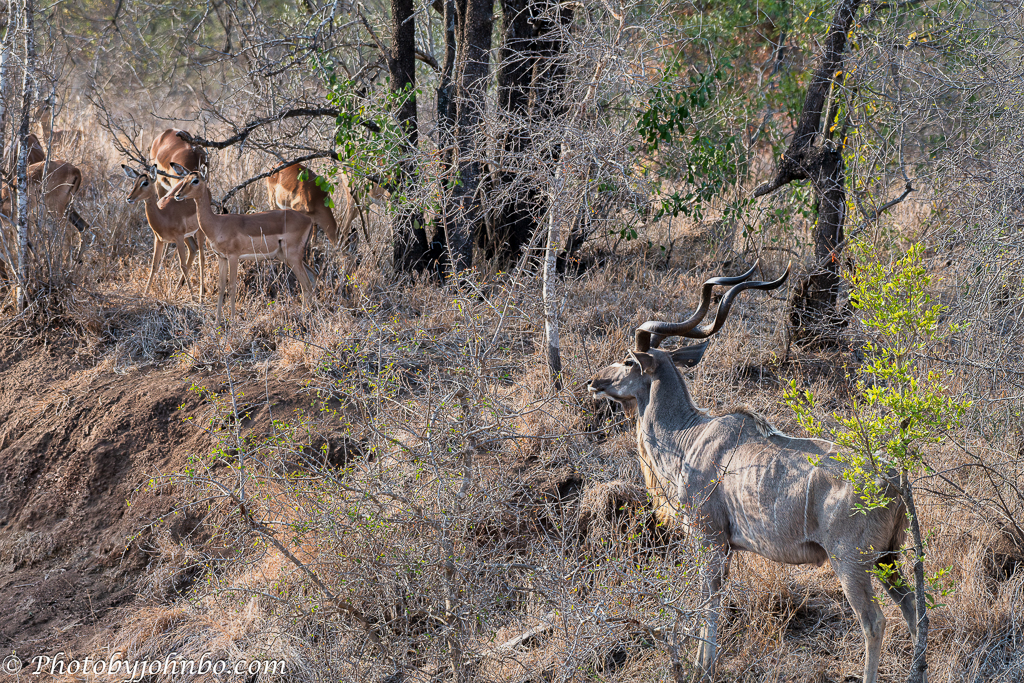
Kruger National Park, South Africa.
As I noted in last week’s Kruger National Park post, day six was a prolific day for us neophyte wildlife photographers. We had plenty of wildlife opportunities at Transport Dam, but the rest of the day was no slouch. We came upon a kudu bull and a small herd of impalas in the early morning light.
Later, we ran across a kudu doe that appeared to be telling us a story.
I try not to miss opportunities to photograph backlit subjects. That solar halo also imparts a translucent glow to the leaves in the foreground.
Across the road, a mother baboon dotes over her young one. Grooming is a fundamental social activity among baboons. It strengthens bonds, reduces stress, and removes parasites. We always found the baboons in small groups.
Even an animal as large as a giraffe can be hard to spot in the tall grasses of the N’waswitshaka River, which flows into the Sabie River near Skukuza.
This giraffe enjoys an early morning breakfast at the side of the road. Google tells me that giraffes can survive without drinking water for long periods, obtaining most of their moisture from the plants they eat.
I took this photo after photographing these impalas on a river bridge. Notice that the impala, not at the watering hole, appears to be looking at something.
Moments later, an alarm was communicated, and all the impalas left the watering hole hurriedly. Looking at the time stamps on the two photos, they were taken only nine seconds apart.
When I captured that shot of the impalas at the watering hole, I overlooked the oxpecker. Once I started editing the photo, I noticed that this impala was totally unconcerned about that oxpecker all but walking into the impala’s ear.
As we traveled through Kruger Park on S65, I took the opportunity to take a panoramic shot and captured this forward view of our progress. The raw snapshot included part of the roof. Near the bottom of the image, the windshield frame bisected the photo. I cropped the top to just below the roof structure and then used Photoshop’s Generative Fill to remove the top frame of the windshield. This left me with a 21×9 panorama.
We stopped for lunch at the Skukuza Golf Club, where you must sign a liability release before venturing on the course. It’s not fenced, and there is no absolute protection from wild animal encounters. I’ll feature more about this golf course in an upcoming post.
On our journey that day, we saw many elephants, and many shots were taken very close to the road. We stopped several times to allow elephants to cross the road in front of us.
This youngster appeared to be enjoying lunch with a smile.
We saw several leopards during our six-day stay, but they always seemed obscured by their hiding places or otherwise not easily photographed. Even this day, I’d already taken two photos of leopards that ended up out of focus behind the sharply focused bushes. Our driver, Irving, stopped when one of his colleagues flagged him. After a long conversation in Afrikaans, Irving filled us in. He was told of a leopard a short distance away that had a kill stolen by a crocodile.
Our persistence was finally rewarded with a sighting of two leopard cubs, no doubt the offspring of the leopard who’d had their meal stolen. We were finally close enough to get some good photographs of the cubs.
Though my zoom lens was almost at its maximum, set to 480 mm to capture the pair of cubs, this photo was cropped to focus on the closest cub’s face. It’s my favorite shot of the day.
By now, many safari vehicles were gathering, making it easier for us to locate the subjects. After waiting in line to see what everyone was looking at, we were close enough to see the cub’s mother lying on a branch in a nearby tree. No doubt resting and thinking, “Now I’ve got to go hunting again to feed the kids.”
As our last full day in Kruger ended, we returned to our Skukuza guest house for our last night’s sleep in Kruger National Park. It would be an early safari day for our last game drive. Our plane was scheduled to depart at 1:35 PM, so we had time for one more excursion. Next week, I’ll share photos of our last day on that morning drive. We would even see another leopard.
John Steiner


















Beautiful pictures!
Thanks!
What an experience! Great photos.
It was, indeed, an experience of a lifetime.
What a wonderful adventure that you had John, along with many beautiful photos. Maybe it’s time to make a safari trip happen!
We really enjoyed our six days exploring Kruger National Park. There was never a dull moment.
Beautiful wildlife shots!
Thanks, Nes!
Fabulous photographs John and I hope the mother leopard will have better luck next time 🙏
Thanks, Xenia. There is nothing like a photo safari to capture in photos the circle of life.
The adventure goes on… Lovely photos!
Thanks, Egidio. Our safari was almost over, but we have many more posts to share over the next several weeks.
Thanks for the pictures John. They are amazing!
Thanks, Anne. More to come with wildlife from Cape Town.
Waiting!!
You made my day. It’s a treat to watch animals in their natural habitat. Excellent photography. The kudu doe, Mother and baby baboon, and Leopard cub stand out. I shouldn’t be partial. All are excellent. Thanks for sharing.
Thank you for the kind words, Indira!
These are in National Park. You captured every muscle, and expression beautifully.
Thanks, Indira. In the coming weeks, I’ll be sharing photos of wildlife we saw in the Cape Town area and visit a botanical garden.
Your favourite shot is mine too, that leopard cub is gorgeous! I love the backlit baboons too and your two elephant shots 🙂
Thanks, Sarah!